
|
|
|
|
Historian David K. Johnson: Exposes the U.S. Government’s Anti-Gay Crusades |
|
David K. Johnson, Ph.D.: In the late 1940s and early 1950s, Republican demagogues charged that homosexuals had infiltrated the federal government under the Roosevelt and Truman administrations and that they posed a threat to national security. They considered communists and homosexuals both to be morally weak and psychologically disturbed. They also argued that homosexuals could be used by the communists—blackmailed by them—into revealing state secrets. This set off a Lavender Scare that affected the lives of thousands of Americans. Much of the vast apparatus of the Cold War loyalty/security system, initiated under the Truman administration and expanded under the Eisenhower administration, was focused on ferreting out and removing both communists and homosexuals from government positions. Civil servants describe horrendous interrogations by government security officials about their sex lives. Merely associating with "known homosexuals" or visiting a gay bar was considered strong enough evidence for dismissal.
David K. Johnson: Ann Coulter is only the most recent and most famous of a growing group of conservative writers bent on re-habilitating the legacy of Joseph McCarthy. They claim that new evidence from Soviet archives vindicates the anti-communist crusaders from the 1950s. In fact, the evidence from the archives is ambiguous at best. As they did in the 1950s with the famous "pumpkin papers," these right-wing pundits engage in a tortured manipulation of the evidence in order to prove their point. They, of course, completely ignore how McCarthy and his allies targeted gays and lesbians as well as communists. When McCarthy made his initial charges that the State Department harbored known security risks, the State Department responded by denying that it had uncovered any communists in its ranks, but admitted that it had fired 91 homosexuals. To the public, this seemed to confirm McCarthy's charges. In the popular imagination, communists and homosexuals were soon conflated. Both seemed to comprise hidden subcultures with their own meeting places, cultural codes, and bonds of loyalty. In the 1950s, fear of political and sexual deviance became so intertwined that it is impossible to understand the Red Scare without also examining the concurrent Lavender Scare. Raj Ayyar: Republican rumor-mongers chased down the son of Senator Lester Hunt, a Democrat from Wyoming. Could you tell GayToday's readers what happened to Senator Hunt in 1954?
Raj Ayyar: I'd say that The Lavender Scare has great current significance as a work of history because it exposes the anti-gay fear-mongering that Republicans initiated during the Cold War Era. It appears, especially as you show Cold War Era Republicans discovered, that voters in rural America were much more alarmed by the presence of homosexuals in the government than of communists. Your history seems to point to today, at how U.S. Senate Majority Leader Frist as well as Senators Allard (R-Colorado), Brownsback (R-Kansas) and Sessions (R.-Alabama) are all now-50 years later-planning to try to use homosexuality as a wedge issue in the upcoming presidential campaign. Like the Republican demagogues in your history book, they're hoping to divert voters from thinking about more important matters, this time by introducing an anti-gay amendment to the U.S. Constitution. Do you agree?
Raj Ayyar: You've discredited certain widely-believed rumors about FBI Director J. Edgar Hoover, especially that he was seen dressed in drag by a mob moll. Could you say a few words about Hoover and about those rumors that swirled around him? David K. Johnson: As I travel around the country researching and now promoting this book, the most common question I get asked is "So what about J. Edgar Hoover?" since it was Hoover's FBI that did most of the security investigations of government officials. It's amazing how the claim of Anthony Summer's book Official and Confidential-that Hoover was not only gay but wore a black negligee at Plaza Hotel orgies-has become part of American popular culture. We will probably never know how Hoover self-identified sexually, but certainly the claims that Summer makes are preposterous. The woman who claims to have seen Hoover at the Plaza hotel was paid for her story and went to jail for perjury in another matter. The only reason that these rumors seem plausible is that we have forgotten the vehemence of the Lavender Scare-how obsessed 1950s Washington was with the threat homosexuals allegedly posed to national security. Even someone as powerful as Hoover could not have kept his job if he had been as blatant as writers like Summer claim.
In 1960 two employees of the super-secret National Security Agency defected to the Soviet Union for political reasons. Yet because Martin and Mitchell were two single men, and one of them had revealed aberrant sexual behavior in his youth (including experimentation with a chicken), they were dubbed a "homosexual love team" that had been blackmailed into defecting. It is a testament to the power of myth over empirical reality.
Raj Ayyar: How long did persecution—The Lavender Scare—last after the ignominious departure of Senator McCarthy from the political scene? David K. Johnson: The Lavender Scare long outlived McCarthy. The system of ferreting out and removing gays and lesbians became institutionalized within the federal loyalty/security system. It remained standard government policy until 1975. By then a number fired gay employees had successfully sued the Civil Service Commission, and these favorable court decisions forced the government to change its policy. Raj Ayyar: Among the more interesting points you've documented in The Lavender Scare is how the federal government's persecution of gays and lesbians during the Cold War Era sparked the development of our gay and lesbian civil rights movement. This was true not only in Los Angeles but a bit later in Washington, D.C. where a tiny group of persecuted gays organized and developed strategies to fight back. What you seem to be saying, apparently, is that our movement's roots are more correctly found in the gay struggle against the U.S. government's firings and mistreatments instead of in the rebellion against corrupt police at the Stonewall bar, a revolt that happened a decade later.
But no community experienced the discriminatory policies of the federal government quite as acutely as Washington, D.C. In the 1950s, the gay and lesbian community there was a community under siege. Government workers who lost their jobs usually had to leave town in order to find employment elsewhere. So it's no accident that Washington, D.C. became the center for a new militancy in the gay movement by the early 1960s. It was there, as gay men and lesbians began to organize and challenge the federal government's discriminatory policies, that they developed much of the rhetoric and tactics of the gay rights movement. By the time the Stonewall Riots occurred in June 1969, gay men had already successfully challenged the government's anti-gay policies in the courts and won several significant legal victories. Raj Ayyar: Since your history credits Dr. Franklin Kameny and the Mattachine Society of Washington for initiating a long but successful struggle against government persecution, what are some of the ways in which the Society's strategies were to became seminal steps leading to our movement's many successes? David K. Johnson: Kameny was one of the first people to use the language of civil rights when referring to the problems confronting gays and lesbians. He saw the treatment of gays and lesbians as analogous to that of racial and religious minorities-a notion we now take for granted but which was quite novel in the 1950s and 1960s. He was also one of the first gay men to "come out" publicly. Most early members of the homophile movement met in private and used pseudonyms in their publications. Kameny made public appearances on behalf of gays and lesbians using his own name. Having already lost his government job, he had little left to lose.
David K. Johnson: That is an interesting analogy. Though the Scopes trial in the 1920s received much more publicity than the Dowdy hearing did in the 1960s, they both illustrate monumental ideological clashes between traditional and "modern" ways of approaching the world. Dowdy expressed the traditional notion that homosexuality was immoral, criminal, and possibly treasonous-a threat to the nation's survival. Kameny deployed a new civil rights rhetoric. Kameny saw homosexuals as an oppressed minority group deserving full citizenship rights. Though this clash of ideas is unfortunately still with us, the Dowdy hearings were one of first public forums in which it played out. Kameny's whole life would make a good dramatic film. He comes in at the end of the story I tell leading the cavalry in a frontal assault on prejudice and homophobia. So yes, shall we start thinking about casting for the film? How about Anthony Hopkins playing the evil congressman Dowdy? Raj Ayyar: You've written a stellar work, one of the most important published gay histories there is and we at GayToday want to thank you heartily for agreeing to talk with us about it. David K. Johnson: Thank you very much. And thanks to Gay Today for being such a big supporter and promoter of glbt history. |
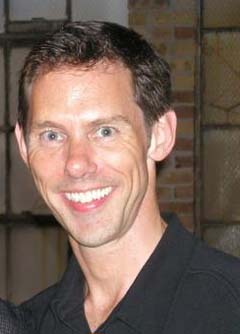 David K. Johnson, Ph.D. is author of The Lavender Scare: The Cold War Persecution of Gays and Lesbians by the Federal Government
David K. Johnson, Ph.D. is author of The Lavender Scare: The Cold War Persecution of Gays and Lesbians by the Federal Government 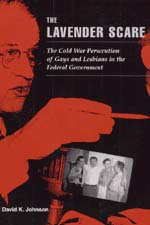 Raj Ayyar: Historian George Chauncey says that after reading your remarkable book, "we will never be able to view the McCarthy Era in the same way again." While most pundits assume that the late Republican demagogue, Senator Joseph McCarthy, was trying to ferret out communists working for the U.S. government, am I right when I say that your book The Lavender Scare doubtlessly proves otherwise and that Ann Coulter's most recent book-wherein she cites McCarthy as a hero and uses him as a starting point-demonstrates that she's a hopeless know-nothing?
Raj Ayyar: Historian George Chauncey says that after reading your remarkable book, "we will never be able to view the McCarthy Era in the same way again." While most pundits assume that the late Republican demagogue, Senator Joseph McCarthy, was trying to ferret out communists working for the U.S. government, am I right when I say that your book The Lavender Scare doubtlessly proves otherwise and that Ann Coulter's most recent book-wherein she cites McCarthy as a hero and uses him as a starting point-demonstrates that she's a hopeless know-nothing?
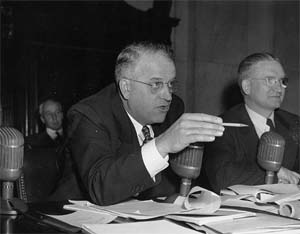 U.S. Senator Kenneth Wherry (R-Nebraska) vigorously
pursued the campaign McCarthy helped unleash against gay men and lesbians in
the federal government. He held special hearings on the subject and asked
his Senate colleagues, "Can (you) think of a person who could be more
dangerous to the United States of America than a pervert?"
U.S. Senator Kenneth Wherry (R-Nebraska) vigorously
pursued the campaign McCarthy helped unleash against gay men and lesbians in
the federal government. He held special hearings on the subject and asked
his Senate colleagues, "Can (you) think of a person who could be more
dangerous to the United States of America than a pervert?" 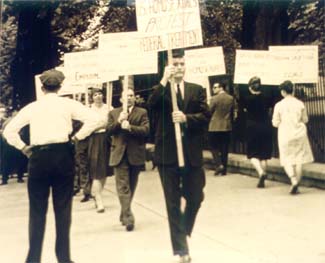 Jack Nichols, GayToday's editor, was Vice-president of The Mattachine Society of Washington in 1965 and is shown here leading one of the Society's protest pickets at the White House during that year. Directly behind him are Dr. Franklin Kameny and Dr. Lilli Vincenz.
Jack Nichols, GayToday's editor, was Vice-president of The Mattachine Society of Washington in 1965 and is shown here leading one of the Society's protest pickets at the White House during that year. Directly behind him are Dr. Franklin Kameny and Dr. Lilli Vincenz. 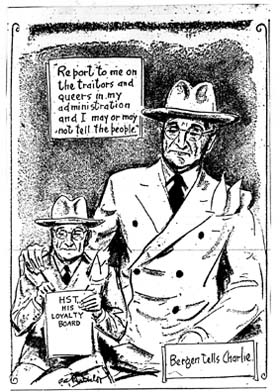 By March 1950 Republicans were calling for an
investigation of the homosexuals in government problem. When President
Truman's loyalty board refused, political cartoons like this one from the
Washington Times-Herald,the city's most widely read newspaper, accused
Truman of protecting "traitors and queers."
By March 1950 Republicans were calling for an
investigation of the homosexuals in government problem. When President
Truman's loyalty board refused, political cartoons like this one from the
Washington Times-Herald,the city's most widely read newspaper, accused
Truman of protecting "traitors and queers." 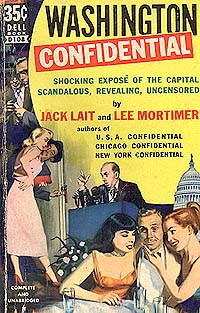 This book helped popularize the notion that the nation's
capital was a haven for homosexuals. The authors charged that the city was
"a garden of pansies"—a city not only teeming with prostitutes, gamblers,
and Communists but "fairies and Fair Dealers".
This book helped popularize the notion that the nation's
capital was a haven for homosexuals. The authors charged that the city was
"a garden of pansies"—a city not only teeming with prostitutes, gamblers,
and Communists but "fairies and Fair Dealers". 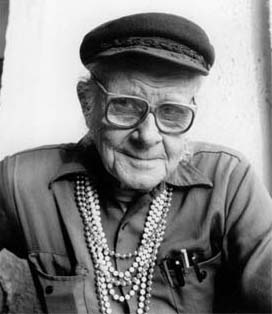 Harry Hay, the founder of the Mattachine Society in California
Harry Hay, the founder of the Mattachine Society in California 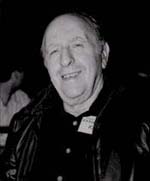 Dr. Franklin Kameny founded the Mattachine
Society of Washington
Dr. Franklin Kameny founded the Mattachine
Society of Washington